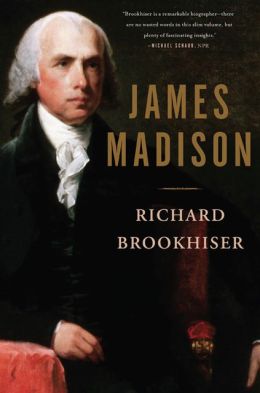I just finished reading James Madison by Richard Brookhiser. I think Brookhiser makes an interesting case that James Madison's genius was for politics.
Madison has been termed the father of the Constitution. He helped create and participated in the Annapolis meeting that called for the Constitutional Convention, and participated in that Convention, speaking frequently. He was one of the authors of the Federalist Papers that explained the Constitution to the public and played an important part in convincing the state conventions to ratify the Constitution. He helped the people of Virginia more directly to ratify. Of course, many people participated in the creation of the Constitution, and it must be seen as a compromise achieved among those may participants and their many ideas and objectives. I see politics as the art of such successful compromise, and Madison was a consummate politician at a time when we must assume that there were few such men. He also kept the best notes of the deliberations of the Constitutional Convention (which were held in closed meetings) and had them published only after his death.
Madison was the fourth president of the United States, the middle president between Jefferson and Monroe, who together led the nation for 24 years. Adding the fourth Virginian -- Washington -- men from that state led the nation for 32 of the first 36 years under the Constitution. He, with Jefferson, founded the Anti-Federalist party, that became the Republican Party (America's first successful party) and is now the Democratic Party.
Madison is credited as the first to perceive that a large democratic republic might be more successful than small republics (which had always failed) because the diversity of interests in a large nation would protect against the tyranny of the majority in a small democracy. He was a lifetime defender of freedom of religion. He believed deeply in the importance of an informed electorate in a democracy, and defended freedom of the press as a vehicle to insure that the electorate was informed.
This is not to say that he was always right. He failed to recognize that the future of the United States was as a manufacturing nation deeply involved in commerce. He opposed Alexander Hamilton's Federalist ideas such as a national bank and a federal role promoting manufacturing. He was a slave owning plantation owner who never accepted the need for the United States to eventually end slavery. He even led the nation into the War of 1812, apparently overestimating U.S. capabilities and underestimating those of the British.
I greatly enjoyed the book. Brookhiser writes an elegant prose and constructs paragraphs, chapters and a thesis that hold together and demand the readers attention.
Incidentally, at this moment as President Obama has called for the advise and consent of the Congress for military action against the Syrian Government's use of chemical weapons, Brookhiser reminds us that the Congress is frequently wrong. In 1812, the Congress declared war on the world's greatest naval power without either an adequate army or navy, having crippled the nation's ability to finance war through misguided economic and financial policies.
Brookhiser doesn't go into other wars, but the Congress failed to understand what it was undertaking in the Civil War. it was bamboozled into the Spanish American War, it failed to prepare the nation for the First World War and World War II, and it was bamboozled into the Gulf of Tonkin Resolution. Even in the Revolutionary War, the Continental Congress failed to find the finances to support the American Army. Good luck President Obama with this Congress, which certainly seems no wiser than those of the past.

No comments:
Post a Comment